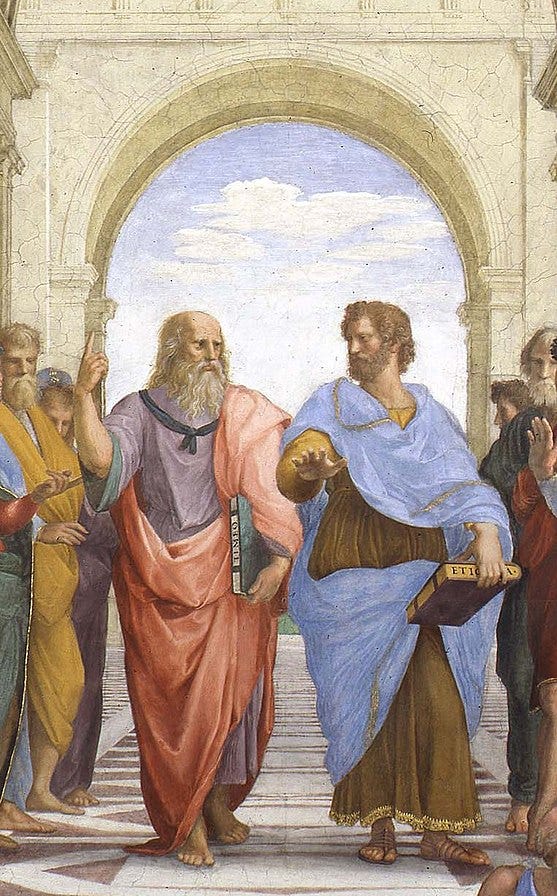On my best days I read during my lunch break. Recently I have been reading one or two of Seneca the Younger’s Letters in a collection1 which my wife gave me as a gift last year.
My copy of Letters from a Stoic. The ticket in the book is an entrance ticket for Cité du Vin in Bordeaux.
The other day while reading Letter LXV, I knew even before completing it that I wanted to write a response. In this letter, Seneca gives an account of an argument he had regarding the nature of causes. This, apparently, was how he decided to cope with his illness.
What spurred me to write was not just that I think Seneca’s conception of causality is wrong - perhaps incomplete is a better word - but also that he cites both an Aristotelian and a Platonic conception of causality. These conceptions are precisely what I think would correct and complete Seneca’s Stoic conception of causality. What Seneca has done in Letter LXV is contrast a concept of causality that I know very well - a Platonic/Aristotelian one - with a concept that I know virtually nothing about, the Stoic.
So I sat down and began preparing my response in a typically argumentative fashion, which began like this:
Seneca defines his (Stoic) understanding of cause as binary: matter and cause.2
Seneca defines cause as creative reason, which is God.3
Therefore, Seneca’s assertion “We know that everything in the universe is composed of matter and of God.” (131-132) follows.
But
Questions of causes are questions of difference - no difference means that there’s nothing for a cause (whatever the definition) to explain
Seneca’s reduction of “cause” to the singular “God” does not of itself explain difference. So,
Either Seneca’s schema is not really engaging in the question of difference at all
Or Seneca is assuming some additional principle that he does not name to explain difference (for example, Ideas in the mind of God in a Platonic style)4
My background to this response is an Aristotelian-Thomistic concept of causality - specifically, the four-fold nature of causality (material, efficient, formal, and final)5. But it was at this point that I began to lose confidence in the argument I constructed. I have read Seneca’s letter a few times in the past couple days to make sure that I understand his position. I do not think that I do. I have little background with a Stoic conception of causality, so I do not have a series of other concepts, thinkers, etc. to help guide my understanding. And of course, the background concepts I have are hostile to (my reading of) Seneca’s account of causality.
One way to highlight this is that Seneca uses the phrases “accessory cause,” “effective cause,” and “general cause.”6 But the way he contrasts or identifies them is not clear to me. Seneca accuses Aristotle’s fourfold7 understanding of causality as focusing on “accessory” causes rather than “efficient” causes. To an Aristotelian/Thomist, this sounds a bit like saying “secondary causality” and “primary” causality - in the way, for example, that a stick moves a rock (secondary cause) because the hand moves the stick (primary causality). Seneca immediately connects “efficient” cause with “general” cause, which sounds to me like it is interested in ultimate causality, or what we might now call something like the “God question.”
Seneca’s invoking of God, however, muddles that interpretation. For Seneca appears to shift from identifying God as cause, in a way that separates God from things, to identifying God as one of two parts (matter and God) that composes everything, which leads to my question in (5) above. Whereas Aristotle would say that a formal cause (the substantial form) explains difference - this thing is a duck because it is composed of the substantial form duck and (prime) matter8 - but Seneca does not seem to bother explaining that.
Thus I had to stop my argument, for I do not understand Seneca. I do not want to beat Seneca, as in, I do not want to win the argument.9 I want to know and understand the truth. My understanding of Seneca’s thought is irrelevant - as I’ve mentioned throughout this post, I compare his thought with my own Aristotelian-Thomistic thought.10 One particular gift I have received from that tradition is a desire and confidence to pursue truth wherever it can be found, but to do that sincerely, I must strive to understand what others - perhaps especially those I disagree with - mean when they speak.
Seneca’s sense of causality seems to me to be fatally flawed. In a sense, it is not fair for me to make that judgment. I do not know the background Stoic concepts upon which he draws very well, and so his position cannot but be alien to me. The Scholastics and Neo Scholastics have written copiously on the Aristotelian basis of causality, and many teachers and authors have helped me understand it better. For Seneca, I’m referring to a single letter and lack a reliable guide. Like I said, hardly a fair comparison. Despite all of those handicaps, I still think that my reaction to his letter is exactly the right reaction, and I do not mean that I am right.
In this letter, Seneca sought his friend’s opinion on the nature of causality. After sharing the context, and sharing his own take, he asks his friend to weigh in and engage in the conversation too. I do not know what, precisely, Seneca expected. Maybe he knew his friend to be a flatterer, and merely sought the guaranteed validation flatterers provide. That would be quite the contrast with Seneca’s other letters, where he expressly criticizes such behavior. But the act of writing a letter, sharing one’s thoughts and inviting another’s, is something I deeply respect.11 Though the letter was not meant for me,12 and though I am not Seneca’s friend, I do think that I have responded precisely the way Seneca wanted me to: to consider the question, engage in his reasoning, and form a reasoned response aimed at the truth.
Dangerously close to my self conception - Rafael’s School of Athens.
There is something extremely refreshing about Seneca asking a friend a philosophical question. Deep questions matter in Seneca’s estimation, and - at least for his philosophically minded colleagues - their value was self-evident. Anyone who knows me will be unsurprised by my eagerness to participate. I spent some time thinking, though, about how I might explain why I have written this post to someone who does not share my prior love of philosophy.
The answer I came up with is that investigating causality matters because the way someone understands causes shape the way they think about everything else. A reduction of causality to efficient causality13 - which may or may not be Seneca’s position (I am unsure), but is a common philosophical assumption today - makes it much harder to resist a materialist perspective. For if the only type of causality recognized is efficient causality, then it becomes much easier to infer, for example, that the predictive and explanatory power of physics entails that reality is a bunch of atoms and nothing more. That inference does not logically follow. But if one only has efficient causality in mind (consciously or not), it is hard to find a “space” for non-material concepts.
I say harder because I do not think it is guaranteed that people who do not have an Aristotelian causal schema will become radical materialists. People have many influences upon their thought, and not everyone has the inclination to pursue a kind of determined philosophical coherence and clarity. But when a question does arise, and someone does seek to resolve a conflict, the concept of causality can skew the answer. The most obvious example is when someone is genuinely wrestling with the existence of God. God is a cause - the Creator of Heaven and Earth - but we (or at least, the relevant scientists) are able to give an efficient causal account of things. Therefore God’s causality (considered in this unitary way) is unnecessary to explain events. God is then reduced, at most, to a kind of deist once-upon-a-time God knocked the first domino over. One might still have faith, or have other reasons, but it will not cohere.
A richer understanding of causality, likewise, does not necessitate belief in a revealed God or even necessitate an acknowledgement of “the god of the philosophers.” I do think God can be rationally demonstrated to exist14, but again, my interest here is much more limited. In the same way that an efficient-exclusive conception of causality creates shaky ground for faith to rest on, an Aristotelian-Thomistic concept of causality creates solid ground. Finding firm ground is one thing, demonstrating God another. Ultimately, I hold an Aristotelian-Thomistic concept of causality because I think it is true - it’s function in holding up arguments is great, but secondary, and only derives that function because it reflects reality as it is. Because it does reflect reality-as-it-is, the conception then helps establish the ground to understand God (in a particular way), and helps to understand the natural world as well.
Letters from a Stoic: Epistulae Morales ad Lucilium, Seneca, selected, translated and translated by Robin Campbell. Penguin Random House UK, initially published 1969.
“Our Stoic philosophers, as you know, maintain that there are two elements in the universe from which all things are derived, namely cause and matter.” (p 125)
“If we ask what cause is, surely the answer is creative reason, that is to say God.” (p 129)
Seneca rejects this in the letter
I haven’t forgotten Plato’s exemplary cause, which Seneca also mentions, though he calls them Ideas in the mind of God (which is, I think, a perfectly good way to conceive of them). I just decided this post would get too unwieldy if I included that.
“To the sculptor his model is as indispensable as his chisel or his file…but this does not make them parts or causes of the art. ‘The end the artist has in view',’ our friend says, ‘the thing which induces him to set about a work of creation, is a cause.’ Even if we grant that it is, it is only an accessory cause, not the effective cause. Accessory causes are infinite in number; what we are after is the general cause.” (p 129)
Seneca actually calls the Aristotelian position three-fold. He acknowledges the telos (final cause), but it does not appear to me that - in this letter - Seneca has (or at least expresses) a very clear understanding of it.
Prime matter is the sheer possibility of “to be" in Aristotelian metaphysics. Seneca’s conception of matter seems quite similar, actually - “Matter lies inert and inactive, a substance with unlimited potential, but destined to remain idle if no one sets it in motion…” (p 125)
I do, of course, want to win the argument. But that’s secondary, and pleasure at best, vanity at worst.
Which, of course, I think is right and true. I wouldn’t be an Aristotelian-Thomist if I didn’t.
I have even started to imitate it.
Though it does seem that Seneca did write his letters with an eye towards their wider publication. “It has been said that they [Seneca’s letters] were real letters edited for publication. It seems most likely that they were intended from the first for publication, possibly preceded by an interval of private circulation. No replies have come down to us.” (p xxiv, from the Introduction) I happily accept the potential fiction that they are letters and will play the role of Lucilius when I want to.
The productive action of an agent
The task of natural theology



